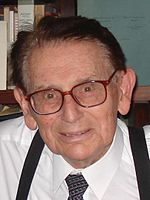Marcos Moshinsky
| Marcos Moshinsky | |
|---|---|
 |
|
| Born |
April 20, 1921 Kiev, Ukrainian SSR |
| Died | 1 April 2009 (aged 87) Mexico City, Mexico |
| Residence | Mexico City |
| Nationality | Mexican |
| Fields | Elementary particles |
| Institutions | National Autonomous University of Mexico |
| Alma mater | National Autonomous University of Mexico, Princeton University. |
| Doctoral advisor | Eugene Paul Wigner |
| Known for | Transformation parenthesis for harmonic oscillator functions |
| Notable awards |
Prince of Asturias Award for Scientific and Technical Investigation (1988) UNESCO Science Prize (1997) Wigner Medal (1998) |
Marcos Moshinsky Borodiansky (Russian: Маркос Мошинский Бородянский; Ukrainian: Маркос Мошинскі; 1921–2009) was a Mexican physicist of Ukrainian-Jewish origin whose work in the field of elementary particles won him the Prince of Asturias Prize for Scientific and Technical Investigation in 1988 and the UNESCO Science Prize in 1997.
He was born in 1921 into a Jewish family in Kiev, Ukrainian SSR. At the age of three, he emigrated as a refugee to Mexico, where he became a naturalized citizen in 1942. He received a bachelor's degree in physics from the National Autonomous University of Mexico (UNAM) and a doctorate in the same discipline at Princeton University under Nobel Laureate Eugene Paul Wigner.
In the 1950s he researched nuclear reactions and the structure of the atomic nucleus, introducing the concept of the transformation parenthesis for functions of harmonic oscillation, which, together with the tables elaborated in collaboration with Thomas A. Brody, simplified calculations in the nucleus layer models and became an indispensable reference for the study of nuclear structures. In 1952, his work on the transient dynamics of matter waves led to the discovery of diffraction in time.
...
Wikipedia
